Friend of Numbers tells the true story of Srinuvasa Ramanujan, who left his home of southern India in 1914 to study under the acclaimed mathematician G.H. Hardy at Cambridge University. Fascinated with numbers since he was a child, Ramanujan’s love of numbers and math keep him going despite the difficulties of adjusting to a place that is so different from home. Recognized as a genius during his time and our own, Ramanujan’s short but brilliant life is portrayed vividly in this picture book biography. The book includes back matter with an author’s note, a glossary of Ramanujan’s world, and mathematical content about number patterns and magic squares.
Mathematics
Lia & Luis: Puzzled! (Storytelling Math)
When Brazilian American twins Lia and Luís receive a jigsaw puzzle from their grandmother, they must quickly solve it to figure out its secret message.
Again, Essie? (Storytelling Math)
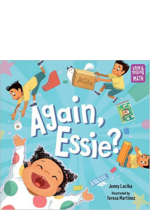
Rafael tries to save his toys from his baby sister, Essie, by building a wall from shoeboxes, toilet paper rolls, and other household objects in this playful exploration of spatial sense and geometry.
¡los Animales No Se Dormían! =
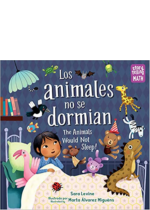
As a budding scientist, Marco tries different ways of sorting his collection of stuffed animal toys before bedtime, but the animals have their own ideas.
Seven Golden Rings
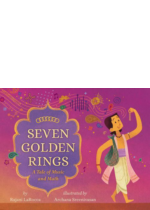
In ancient India, a boy named Bhagat travels to the rajah’s city, hoping to ensure his family’s prosperity by winning a place at court as a singer. Includes author’s note about binary numbers.
Lia And Luís
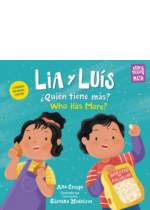
Brazilian American twin siblings, Lia and Luís, are always competing, even when it comes to their favorite Brazilian snacks from their family’s store; they want to know which of them has more, and they use various mathematical techniques to pick a winner–and then share the delicious results.
Maryam’s Magic: The Story Of Mathematician Maryam Mirzakhani
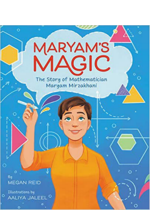
The true story of Maryam Mirzakhani, an Iranian girl whose creativity and love of stories helped her and the world see math in a new way, and who was the only woman ever to win the Fields Medal, the most prestigious honor in mathematics.–
Molly And The Mathematical Mysteries: ten interactive adventures in mathematical wonderland
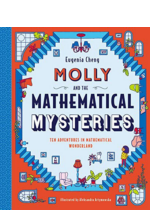
Join Molly as she ventures into a curious world where nothing is quite as it seems. A trail of clues leads from scene to scene, presenting Molly with a number of challenges. But who is leaving the clues, and where will they lead? This interactive mystery shows math isn’t just about numbers-it’s about imagination! An explorative and creative approach to the world of mathematics.
Featured in WOW Review Volume XIV, Issue 2.
Bracelets For Bina’s Brothers
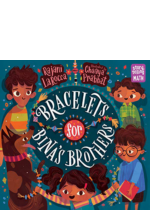
For the Hindu holiday of Raksha Bandhan, Bina is determined to make beaded bracelets for her brothers all by herself. She finds out which colors her brothers like and dislike and sets to work. Working with her every-other-one beading pattern causes Bina to discover something new about patterns–and her brothers.
Count On Me
Everyone has a passion. For some, it’s music. For others, it’s art. For our heroine, it’s math. When she looks around the world, she sees math in all the beautiful things: the concentric circles a stone makes in a lake, the curve of a slide, the geometric shapes in the playground. Others don’t understand her passion, but she doesn’t mind. There are infinite ways to see the world. And through math is one of them.
This book is a gorgeous ode to something vital but rarely celebrated. In the eyes of this little girl, math takes its place alongside painting, drawing and song as a way to ponder the beauty of the world.
